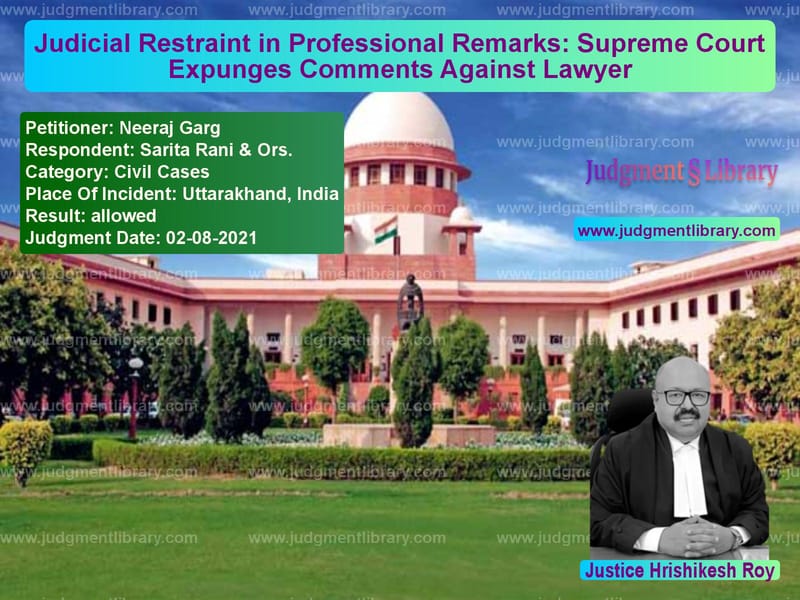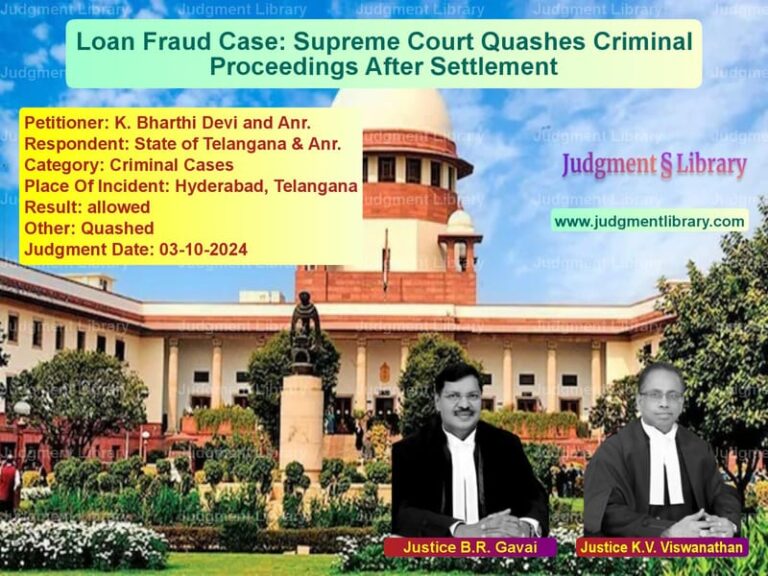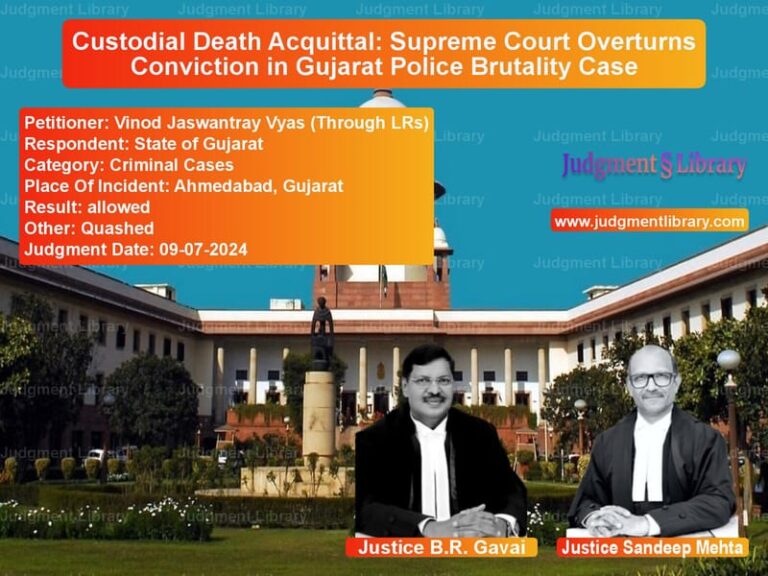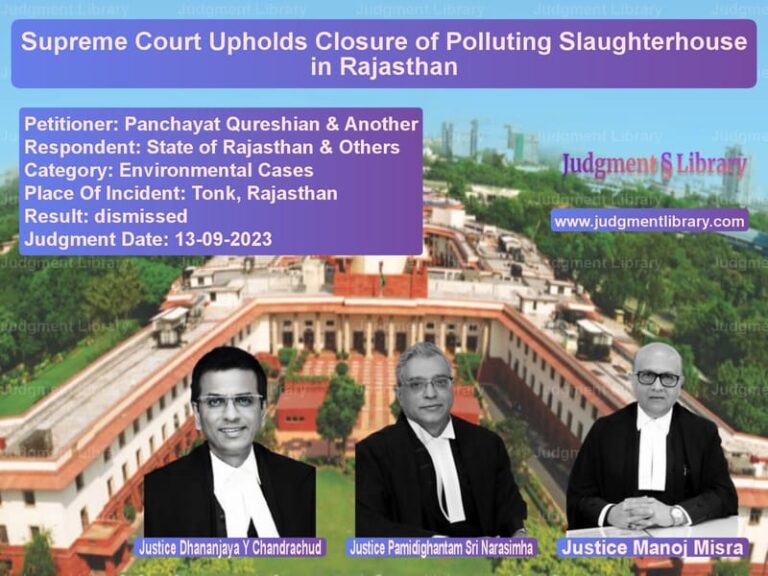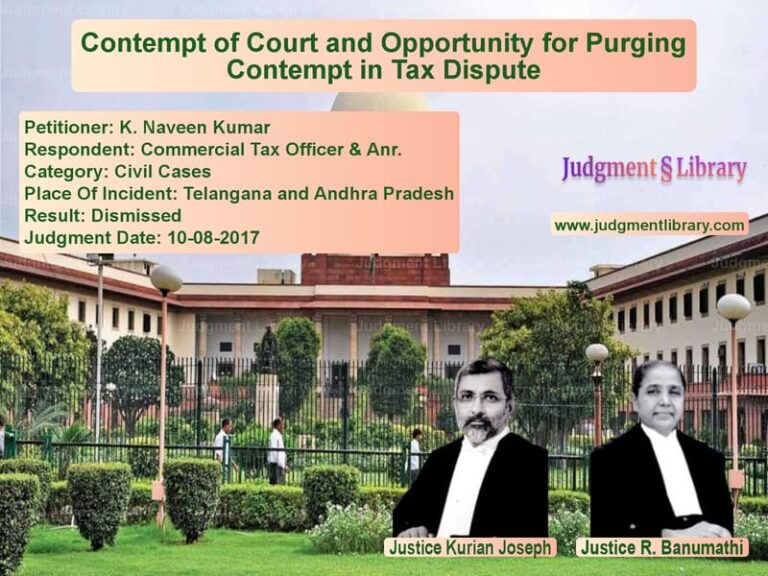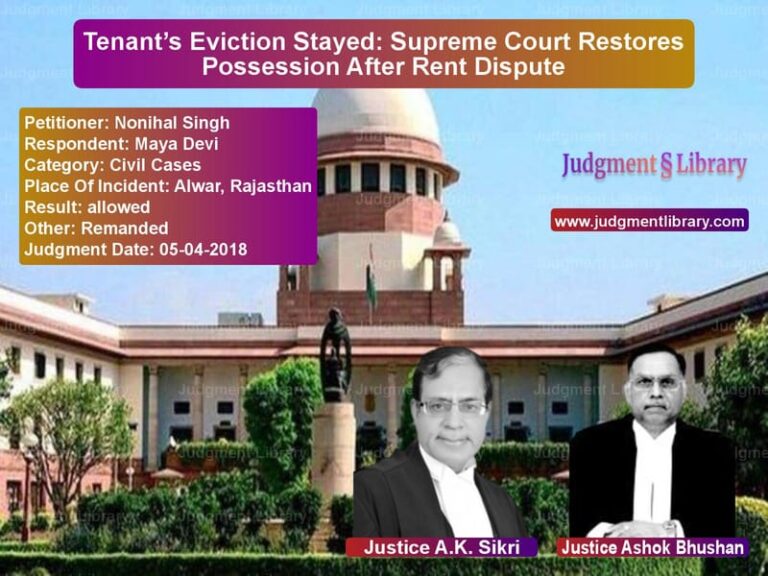Judicial Restraint in Professional Remarks: Supreme Court Expunges Comments Against Lawyer
The case of Neeraj Garg vs. Sarita Rani & Ors. is a significant ruling concerning the principles of judicial restraint and professional dignity in the legal profession. The Supreme Court was tasked with determining whether certain remarks made by the Uttarakhand High Court against a practicing lawyer should be expunged from the record.
This case arose from a series of judicial comments made by a High Court judge against the appellant, Neeraj Garg, a lawyer practicing in the Uttarakhand High Court. The appellant contended that these remarks were uncalled for, affected his professional reputation, and were made without affording him an opportunity to explain his conduct.
Background of the Case
The appellant, Neeraj Garg, had been practicing law for 17 years before the Uttarakhand High Court. His appeal was not related to any substantive legal issue but was limited to expunging adverse observations made against him in four separate cases in which he was representing one of the contesting parties.
The following cases were cited as those in which the High Court made remarks against the appellant:
- W.P. (M/S) No. 2216 of 2017 and W.P. (M/S) No. 2208 of 2017: The judge expressed “deep anguish” and suggested that the appellant had suppressed material facts to procure an interim order.
- S.A. No. 190 of 2019: The judge remarked that the appellant’s arguments were “an assassination of time” and seemed to be intended for “the visitors’ gallery.”
- S.A. No. 182 of 2019: The judge observed that the appellant attempted to avoid an argument at the admission stage.
- W.P. (M/S) No. 519 of 2019: The judge stated that the appellant had a “modus operandi” of submitting voluminous documents to delay the proceedings.
Petitioner’s Arguments
The appellant, Neeraj Garg, argued that:
- The adverse remarks were made without putting him on notice or affording him an opportunity to explain his conduct.
- The observations were neither essential nor necessary for the Court’s verdict in the cases.
- The remarks harmed his professional reputation and could adversely impact his career.
- The judge who made the remarks had previously practiced at the same Bar and had been a rival counsel in multiple matters before elevation to the Bench, raising concerns of bias.
Respondent’s Arguments
Although the respondents were formally included in the appeal, they were treated as proforma respondents since the appellant was not seeking any relief against them. No direct arguments were presented in opposition to the plea for expunction of remarks.
Key Legal Issues
The Supreme Court examined the following issues:
- Whether the adverse remarks made by the High Court were necessary for adjudicating the matters.
- Whether the appellant had been given an opportunity to defend himself before such remarks were recorded.
- Whether the remarks had the potential to harm the appellant’s professional reputation and practice.
- Whether judicial restraint should be exercised in making comments about advocates.
Court’s Observations
The Supreme Court made several significant observations:
1. Principles of Judicial Restraint
The Court cited the case of State of U.P. vs. Mohammad Naim (1964), where it was held that adverse remarks against a person should not be made unless:
- The person is before the Court and has had an opportunity to explain his conduct.
- There is evidence on record to justify the remarks.
- The remarks are necessary for the decision of the case.
The Court found that the remarks against the appellant failed to meet these criteria.
2. Need for Fair Hearing
The Court emphasized that a person whose conduct is being questioned must be given an opportunity to explain himself. The appellant was not given such an opportunity before the remarks were recorded.
3. Unwarranted Damage to Reputation
The Court noted that the remarks cast aspersions on the professional integrity of the appellant and had the potential to impact his legal practice.
4. Restraint in Judicial Language
The Court referred to precedents, including A.M. Mathur vs. Pramod Kumar Gupta (1990) and Alok Kumar Roy vs. Dr. S.N. Sarma (1968), which emphasized that judges should exercise restraint and use temperate language in judicial pronouncements.
Final Verdict
The Supreme Court allowed the appeal and made the following rulings:
- The adverse remarks recorded against the appellant in the High Court judgments were expunged.
- The Court reiterated the need for judicial restraint when making observations about members of the Bar.
- The appellant’s professional reputation should not suffer due to remarks that were unnecessary for adjudicating the disputes.
The Court concluded:
“While it is of fundamental importance in the realm of administration of justice to allow the judges to discharge their functions freely and fearlessly, it is equally important for the judges to exercise restraint and avoid unnecessary remarks on the conduct of counsel which may have no bearing on the adjudication of the dispute before the Court.”
Implications of the Judgment
This ruling has significant implications for judicial decorum and the legal profession:
- Preserving Professional Reputation: Advocates should not suffer lasting damage to their careers due to judicial remarks that are unnecessary for case adjudication.
- Requirement of Fair Hearing: Before making adverse comments, judges must ensure that the person affected has been given a chance to explain.
- Guidelines for Judicial Remarks: The judgment reinforces the principle that judicial observations should be restrained, balanced, and essential for the decision of the case.
- Strengthening the Bar-Bench Relationship: The ruling promotes harmony between the judiciary and the legal profession by discouraging unwarranted criticism.
Overall, the judgment underscores the importance of fairness, restraint, and respect in judicial proceedings to maintain the dignity of both the Bench and the Bar.
Petitioner Name: Neeraj Garg.Respondent Name: Sarita Rani & Ors..Judgment By: Justice Hrishikesh Roy.Place Of Incident: Uttarakhand, India.Judgment Date: 02-08-2021.
Don’t miss out on the full details! Download the complete judgment in PDF format below and gain valuable insights instantly!
Download Judgment: neeraj-garg-vs-sarita-rani-&-ors.-supreme-court-of-india-judgment-dated-02-08-2021.pdf
Directly Download Judgment: Directly download this Judgment
See all petitions in Legal Malpractice
See all petitions in Contempt Of Court cases
See all petitions in Other Cases
See all petitions in Judgment by Hrishikesh Roy
See all petitions in allowed
See all petitions in supreme court of India judgments August 2021
See all petitions in 2021 judgments
See all posts in Civil Cases Category
See all allowed petitions in Civil Cases Category
See all Dismissed petitions in Civil Cases Category
See all partially allowed petitions in Civil Cases Category

